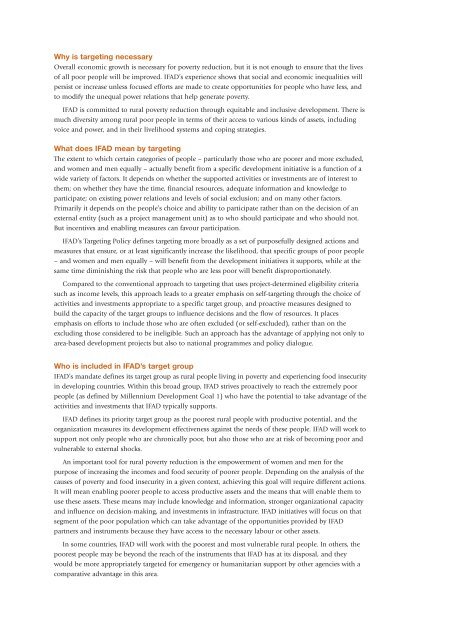Poverty targeting in IFAD- supported projects
Poverty targeting in IFAD- supported projects
Poverty targeting in IFAD- supported projects
Create successful ePaper yourself
Turn your PDF publications into a flip-book with our unique Google optimized e-Paper software.
Why is <strong>target<strong>in</strong>g</strong> necessary<br />
Overall economic growth is necessary for poverty reduction, but it is not enough to ensure that the lives<br />
of all poor people will be improved. <strong>IFAD</strong>’s experience shows that social and economic <strong>in</strong>equalities will<br />
persist or <strong>in</strong>crease unless focused efforts are made to create opportunities for people who have less, and<br />
to modify the unequal power relations that help generate poverty.<br />
<strong>IFAD</strong> is committed to rural poverty reduction through equitable and <strong>in</strong>clusive development. There is<br />
much diversity among rural poor people <strong>in</strong> terms of their access to various k<strong>in</strong>ds of assets, <strong>in</strong>clud<strong>in</strong>g<br />
voice and power, and <strong>in</strong> their livelihood systems and cop<strong>in</strong>g strategies.<br />
What does <strong>IFAD</strong> mean by <strong>target<strong>in</strong>g</strong><br />
The extent to which certa<strong>in</strong> categories of people – particularly those who are poorer and more excluded,<br />
and women and men equally – actually benefit from a specific development <strong>in</strong>itiative is a function of a<br />
wide variety of factors. It depends on whether the <strong>supported</strong> activities or <strong>in</strong>vestments are of <strong>in</strong>terest to<br />
them; on whether they have the time, f<strong>in</strong>ancial resources, adequate <strong>in</strong>formation and knowledge to<br />
participate; on exist<strong>in</strong>g power relations and levels of social exclusion; and on many other factors.<br />
Primarily it depends on the people’s choice and ability to participate rather than on the decision of an<br />
external entity (such as a project management unit) as to who should participate and who should not.<br />
But <strong>in</strong>centives and enabl<strong>in</strong>g measures can favour participation.<br />
<strong>IFAD</strong>’s Target<strong>in</strong>g Policy def<strong>in</strong>es <strong>target<strong>in</strong>g</strong> more broadly as a set of purposefully designed actions and<br />
measures that ensure, or at least significantly <strong>in</strong>crease the likelihood, that specific groups of poor people<br />
– and women and men equally – will benefit from the development <strong>in</strong>itiatives it supports, while at the<br />
same time dim<strong>in</strong>ish<strong>in</strong>g the risk that people who are less poor will benefit disproportionately.<br />
Compared to the conventional approach to <strong>target<strong>in</strong>g</strong> that uses project-determ<strong>in</strong>ed eligibility criteria<br />
such as <strong>in</strong>come levels, this approach leads to a greater emphasis on self-<strong>target<strong>in</strong>g</strong> through the choice of<br />
activities and <strong>in</strong>vestments appropriate to a specific target group, and proactive measures designed to<br />
build the capacity of the target groups to <strong>in</strong>fluence decisions and the flow of resources. It places<br />
emphasis on efforts to <strong>in</strong>clude those who are often excluded (or self-excluded), rather than on the<br />
exclud<strong>in</strong>g those considered to be <strong>in</strong>eligible. Such an approach has the advantage of apply<strong>in</strong>g not only to<br />
area-based development <strong>projects</strong> but also to national programmes and policy dialogue.<br />
Who is <strong>in</strong>cluded <strong>in</strong> <strong>IFAD</strong>’s target group<br />
<strong>IFAD</strong>’s mandate def<strong>in</strong>es its target group as rural people liv<strong>in</strong>g <strong>in</strong> poverty and experienc<strong>in</strong>g food <strong>in</strong>security<br />
<strong>in</strong> develop<strong>in</strong>g countries. With<strong>in</strong> this broad group, <strong>IFAD</strong> strives proactively to reach the extremely poor<br />
people (as def<strong>in</strong>ed by Millennium Development Goal 1) who have the potential to take advantage of the<br />
activities and <strong>in</strong>vestments that <strong>IFAD</strong> typically supports.<br />
<strong>IFAD</strong> def<strong>in</strong>es its priority target group as the poorest rural people with productive potential, and the<br />
organization measures its development effectiveness aga<strong>in</strong>st the needs of these people. <strong>IFAD</strong> will work to<br />
support not only people who are chronically poor, but also those who are at risk of becom<strong>in</strong>g poor and<br />
vulnerable to external shocks.<br />
An important tool for rural poverty reduction is the empowerment of women and men for the<br />
purpose of <strong>in</strong>creas<strong>in</strong>g the <strong>in</strong>comes and food security of poorer people. Depend<strong>in</strong>g on the analysis of the<br />
causes of poverty and food <strong>in</strong>security <strong>in</strong> a given context, achiev<strong>in</strong>g this goal will require different actions.<br />
It will mean enabl<strong>in</strong>g poorer people to access productive assets and the means that will enable them to<br />
use these assets. These means may <strong>in</strong>clude knowledge and <strong>in</strong>formation, stronger organizational capacity<br />
and <strong>in</strong>fluence on decision-mak<strong>in</strong>g, and <strong>in</strong>vestments <strong>in</strong> <strong>in</strong>frastructure. <strong>IFAD</strong> <strong>in</strong>itiatives will focus on that<br />
segment of the poor population which can take advantage of the opportunities provided by <strong>IFAD</strong><br />
partners and <strong>in</strong>struments because they have access to the necessary labour or other assets.<br />
In some countries, <strong>IFAD</strong> will work with the poorest and most vulnerable rural people. In others, the<br />
poorest people may be beyond the reach of the <strong>in</strong>struments that <strong>IFAD</strong> has at its disposal, and they<br />
would be more appropriately targeted for emergency or humanitarian support by other agencies with a<br />
comparative advantage <strong>in</strong> this area.

















